|
Books Should Be Free Loyal Books Free Public Domain Audiobooks & eBook Downloads |
|
|
Books Should Be Free Loyal Books Free Public Domain Audiobooks & eBook Downloads |
|
Religion |
|---|
|
Book type:
Sort by:
View by:
|
By: Andrew Murray (1828-1917) | |
|---|---|
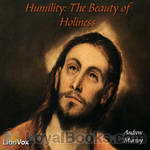 Humility : The Beauty of Holiness
Humility : The Beauty of Holiness
A book on the all importance of humility, how Jesus was humble, and how we also can become humble. Murray wrote “Without humility, there can be no true abiding in God’s presence or experience of His favor and the power of His spirit. Without it there can be no abiding faith or love or joy or strength.” | |
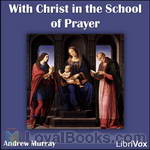 With Christ in the School of Prayer
With Christ in the School of Prayer
It is under a deep impression that the place and power of prayer in the Christian life is too little understood, that this book has been written. I feel sure that as long as we look on prayer chiefly as the means of maintaining our own Christian life, we shall not know fully what it is meant to be. But when we learn to regard it as the highest part of the work entrusted to us, the root and strength of all other work, we shall see that there is nothing that we so need to study and practise as the art of praying aright... | |
 The School of Obedience
The School of Obedience
Andrew Murray describes the necessity and benefits of absolute obedience to God. He goes on to explain the way to achieve this level of obedience, which is required of all believers, and attainable through God’s provision. | |
 Holy in Christ Thoughts on the Calling of God's Children to be Holy as He is Holy
Holy in Christ Thoughts on the Calling of God's Children to be Holy as He is Holy
In introducing this book, which Andrew Murray sub-titled “Thoughts on the Calling of God’s Children to Be Holy as He is Holy”, I can do no better than to quote from the author’s own Preface: “It has been my earnest desire that I might be a helper of the faith of my brethren in seeking to trace with them the wondrous revelation of God’s Holiness through the ages as recorded in His blessed Word. It has been my continual prayer that God might use what is written to increase in His children the conviction that we must be holy, the knowledge of how we are to be holy, the joy that we may be holy, the faith that we can be holy... | |
 'Jesus Himself'
'Jesus Himself'
Is it possible to be familiar with Jesus, to know the Bible, to be involved in church life, and yet not really know Jesus at all well? Andrew Murray, with his perceptive insights into the church of his day, and indeed of ours too, shows how this is all too often the condition of many believers. In the two essays comprising this book, Murray shows how we can move to a new place in really knowing Jesus, and how the presence of the Lord can become much more real to us. There is a cost, but God always abundantly rewards those who seek Him with their whole heart. | |
By: John Stuart Mill (1806-1873) | |
|---|---|
 Auguste Comte and Positivism
Auguste Comte and Positivism
Part 1 lays out the framework for Positivism as originated in France by Auguste Comte in his Cours de Philosophie Positive. Mill examines the tenets of Comte's movement and alerts us to defects. Part 2 concerns all Comte's writings except the Cours de Philosophie Positive. During Comte's later years he gave up reading newspapers and periodicals to keep his mind pure for higher study. He also became enamored of a certain woman who changed his view of life. Comte turned his philosophy into a religion, with morality the supreme guide. Mill finds that Comte learned to despise science and the intellect, instead substituting his frantic need for the regulation of change. | |
By: Saint Thomas Aquinas (1225-1274) | |
|---|---|
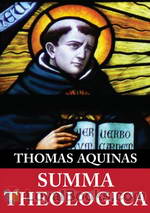 Summa Theologica, Pars Prima
Summa Theologica, Pars Prima
More than nine hundred years after it was first written, this unfinished work of a scholar saint still has the power to move our minds and hearts and set us thinking on the really important questions of life. Summa Theologica or simply the Summa as it is known, was written some time between 1265-74. It is a work that has had a profound and enduring influence on Western thought and literature. Designed to provide answers to Catholic theologians about the teachings of the Church, Thomas Aquinas' book instead goes far beyond its stated purpose... | |
By: Kate Douglas Wiggin | |
|---|---|
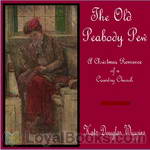 The Old Peabody Pew: A Christmas Romance of a Country Church
The Old Peabody Pew: A Christmas Romance of a Country Church
A sweet, old fashioned Christmas romance set in an old New England meeting house. | |
By: Unknown | |
|---|---|
 The Bible, Weymouth New Testament (WNT) - Matthew
The Bible, Weymouth New Testament (WNT) - Matthew
The Weymouth New Testament ("WNT"), otherwise known as The New Testament in Modern Speech or The Modern Speech New Testament, is a translation into "modern" English as used in the nineteenth century from the text of The Resultant Greek Testament by Richard Francis Weymouth from the Greek idioms used in it. It was later edited and partly revised by Reverend Ernest Hampden-Cook in London, England. Publishers: Baker and Taylor Company (New York) in 1903 and James Clarke & Co (London) in 1903.Richard Francis Weymouth's popular translation of the New Testament into English was first published in 1903 and has been in print through numerous editions ever since with millions of copies sold... | |
By: David Hume (1711-1776) | |
|---|---|
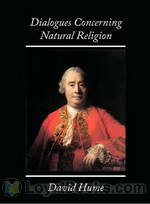 Dialogues Concerning Natural Religion
Dialogues Concerning Natural Religion
In Dialogues Concerning Natural Religion, philosopher David Hume examines whether belief in God can be rational. The work takes the form of a debate between three characters: Cleanthes, who argues that the existence and nature of God can be empirically verified; Demea, who argues that God is completely beyond human knowledge; and Philo, a philosophical skeptic widely thought to represent Hume’s own beliefs. Much of the debate centers around Cleanthes’ presentation of the analogical argument from design... | |
By: Francis Bacon (1561-1626) | |
|---|---|
 The New Atlantis
The New Atlantis
In 1623, Francis Bacon expressed his aspirations and ideas in New Atlantis. Released in 1627, this was his creation of an ideal land where people were kind, knowledgeable, and civic-minded. Part of this new land was his perfect college, a vision for our modern research universities. Islands he had visited may have served as models for his ideas. | |
By: Louis Ginzberg (1873-1953) | |
|---|---|
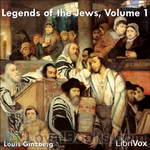 Legends of the Jews
Legends of the Jews
Rabbi Louis Ginzberg was one of the outstanding Talmudists of the twentieth century. He was born on November 28, 1873, in Kovno, Lithuania; he died on November 11, 1953, in New York City. Ginzberg taught at the Jewish Theological seminary from 1903 to 1953. For 50 years, he trained two generations of Conservative Rabbis.The Legends of the Jews is an epic 7-volume compilation of traditional Jewish stories loosely related to the Bible. Volumes 1-4 contain the stories, while volumes 5-7 contain Ginzberg’s notes and commentary... | |
By: Anatole France (1844-1924) | |
|---|---|
 Thais
Thais
The fourth century ascetic Paphnuce, journeys from his remote desert hermitage to urban Alexandria determined to locate the stunningly beautiful and libertine actress, Thais. He earnestly desires that she convert to Christianity. Gaining an audience by deception, the hermit passionately speaks to the actress of eternity. Remarkably, Thais repents and retires to a convent for the rest of her days. The hermit however, cannot rid his mind of her charms, not even with the help of the most severe austerities. After years of anguish the monk learns of Thais' immanent demise and hastens to her side. There he confesses the unspeakable. | |
 Revolt of the Angels
Revolt of the Angels
Anatole France, in his satirical and allegorical fashion, weaves a tale of fantasy which finds a mischievous guardian angel stealing books from his earthly charge, who happens to be an archbishop in possession of a plethora of literature, mostly theological in nature. After voracious reading and then becoming a "fallen" angel, he decides to search for and recruit other "fallen" angels who devise a plan to attempt an overthrow of the rule which had set their fate, realizing that revolt is necessary and inevitable... | |
By: Upton Sinclair (1878-1968) | |
|---|---|
 The Profits of Religion
The Profits of Religion
The Profits of Religion: An Essay in Economic Interpretation is a non-fiction book by the American novelist and muckraking journalist Upton Sinclair, first published in 1917. It is a snapshot of the religious movements in the U.S. before its entry into World War I. In this book, Sinclair attacks institutionalized religion as a "source of income to parasites, and the natural ally of every form of oppression and exploitation." | |
By: Israel Zangwill (1864-1926) | |
|---|---|
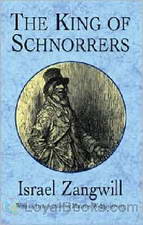 The King of Schnorrers
The King of Schnorrers
Manasseh da Costa is a schnorrer (beggar) who lives on the charitable contributions of the Jews of late 18th-century London. But Manasseh is far from being a humble panhandler for, as every schnorrer knows, supporting the poor is a commandment from God (a mitzvah) not just a favour. And as the descendant of Portuguese Jews who had lived in England for many generations, Manasseh is the social superior of those newly arrived from Eastern Europe (called ‘Tedesco’), even his wealthy patron Joseph Grobstock... | |
 Children of the Ghetto
Children of the Ghetto
In this 1892 novel of London's Jewish East End, Israel Zangwill sets the apparently irrational and decidedly indecorous religious practices of transplanted eastern European Jews against the forces of assimilation. Zangwill's knowledge of Yiddishkeit and skill in melodrama created a series of unforgettable vignettes that had a significant effect on the public perception of this much stigmatized immigrant group. Israel Zangwill (1864-1926) was born in London of Russian and Polish parents. He coined the term cultural "melting pot". | |
By: Henry van Dyke (1852-1933) | |
|---|---|
 The Story of the Other Wise Man
The Story of the Other Wise Man
You know the story of the Three Wise Men of the East, and how they travelled from far away to offer their gifts at the manger-cradle in Bethlehem. But have you ever heard the story of the Other Wise Man, who also saw the star in its rising, and set out to follow it, yet did not arrive with his brethren in the presence of the young child Jesus? Of the great desire of this fourth pilgrim, and how it was denied, yet accomplished in the denial; of his many wanderings and the probations of his soul;... | |
By: Santa Teresa de Jesus (1515-1582) | |
|---|---|
 The Life of St. Teresa
The Life of St. Teresa
Saint Teresa of Ávila, also called Saint Teresa of Jesus, baptized as Teresa Sánchez de Cepeda y Ahumada, (March 28, 1515, at Gotarrendura (Ávila), Old Castile, Spain – October 4, 1582, at Alba de Tormes, Salamanca, Spain) was a prominent Spanish mystic, Carmelite nun, and writer of the Counter Reformation. She was a reformer of the Carmelite Order and is considered to be, along with John of the Cross, a founder of the Discalced Carmelites. In 1970 she was named a Doctor of the Church by Pope Paul VI. | |
 Conceptions of Divine Love
Conceptions of Divine Love
Conceptions of Divine Love was written in 1577. St. Teresa wrote this with the idea of explaining certain words found in the Book of Canticles. When her confessor read the title of her work, he ordered her to immediately burn it, which, of course, she did. But one of her nuns had copied the first seven chapters, which was then published in 1612. Here, Father John Dalton has translated only four of those chapters in 1852. | |
By: H. G. Wells (1866-1946) | |
|---|---|
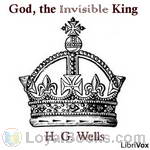 God, the Invisible King
God, the Invisible King
Wells wrote in his book God the Invisible King that his idea of God did not draw upon the traditional religions of the world: "This book sets out as forcibly and exactly as possible the religious belief of the writer. [Which] is a profound belief in a personal and intimate God." Later in the work he aligns himself with a "renascent or modern religion ... neither atheist nor Buddhist nor Mohammedan nor Christian ... [that] he has found growing up in himself." | |
By: Thomas Bulfinch (1796-1867) | |
|---|---|
 Bulfinch's Mythology: The Age of Fable
Bulfinch's Mythology: The Age of Fable
Bulfinch’s Mythology, first published in 1855, is one of the most popular collections of mythology of all time. It consists of three volumes: The Age of Fable, The Age of Chivalry, and Legends of Charlemagne. This is a recording of the tenth edition of the first volume, The Age of Fable. It contains many Greek and Roman myths, including simplified versions of The Iliad and The Odyssey, as well as a selection of Norse and “eastern” myths. Thomas Bulfinch’s goal was to make the ancient myths accessible to a wide audience, and so it is suitable for children. | |
By: John Foxe | |
|---|---|
 Foxe's Book of Martyrs, A History of the Lives
Foxe's Book of Martyrs, A History of the Lives
The Book of Martyrs, by John Foxe, is an English Protestant account of the persecutions of Protestants, many of whom had died for their beliefs within the decade immediately preceding its first publication. It was first published by John Day, in 1563. Lavishly illustrated with many woodcuts, it was the largest publishing project undertaken in Britain up to that time. Commonly known as, “Foxe’s Book of Martyrs”, the work’s full title begins with “Actes and Monuments of these Latter and Perillous Days, Touching Matters of the Church... | |
By: Isabella Alden (1841-1930) | |
|---|---|
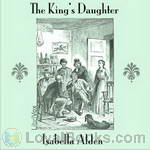 The King's Daughter
The King's Daughter
Dell Bronson has been reared in Boston by her refined uncle and aunt until, at age 18, she is called home by her father, a coarse tavern owner in Lewiston. As a daughter of the heavenly King, she strives to honor her heavenly Father by wooing her earthly father to Christ and away from rum. Set in the era of the temperance movement of the 1800’s. Authored by Isabella M. Alden under the pen name “Pansy.” Third in the Ester Ried series. | |
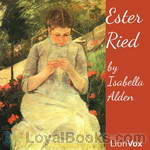 Ester Ried
Ester Ried
Authored by Isabella M. Alden under the pen name “Pansy.” Ester Ried’s life is a dull monotony of toiling at her family’s boardinghouse. She’s overworked, jealous and cranky, a poor example of a Christian to her family and associates. She awakens to a new attitude and commitment due to an extended visit with her cousin. | |
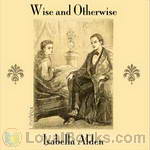 Wise and Otherwise
Wise and Otherwise
Immature Mr. Tresevant (from “The King’s Daughter”) comes to Newton with his spoiled wife to be the new pastor of the church attended by Dr. and Mrs. Douglass, Mr. and Mrs. Sayles, and Mr. and Mrs. Tyndall (from “Ester Ried” and “Julia Ried”), boarding with Jerome and Abbie Sayles. Authored by Isabella M. Alden under the pen name “Pansy.” Fourth in the Ester Ried series. | |
 Julia Ried
Julia Ried
Authored by Isabella M. Alden under the pen name “Pansy.” Sequel to “Ester Ried.” Julia Ried must take a job as a bookkeeper in a factory to earn a living. The mistress of her boardinghouse influences her in a negative way, drawing her into a life and attitude displeasing to God. Will her family and friends be able to convince her stand up for what’s right? | |
 Four Girls at Chautauqua
Four Girls at Chautauqua
Authored by Isabella M. Alden under the pen name “Pansy.” First in the Chautauqua Girls series. Four friends – spoiled, quirky Ruth; fun-loving and mischievous Eurie; poor, independent and brainy Marion; and meek, approval-seeking Flossy – attend Chautauqua on a lark, and their lives are changed forever. (Chautauqua is an adult education movement in the United States, highly popular in the late 19th and early 20th centuries. The Chautauqua brought entertainment and culture for the whole community, with speakers, teachers, musicians, entertainers, preachers and specialists of the day.) | |
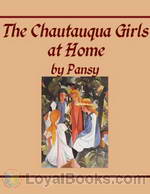 The Chautauqua Girls at Home
The Chautauqua Girls at Home
Sequel to Four Girls at Chautauqua. Ruth, Flossy, Eurie, and Ruth return home as new Christians, eager to begin working. Their new faith clashes with their old lives, which they must overcome, as well as the prejudices of friends and acquaintances. | |
 Ester Ried's Namesake
Ester Ried's Namesake
Ester Ried Randall tries to live up to her parents’ expectations and the name she’s been given, but her religion is a chore. Will she learn the lesson of faith that Ester did? Fifth and final book in the Ester Ried series. Authored by Isabella M. Alden under the pen name “Pansy.” | |
 Judge Burnham's Daughters
Judge Burnham's Daughters
Fifth in the Chautauqua Girls series. Ruth Erskine Burnham has helped raise her husband’s two daughters, but all have rejected her faith and values. The constant pressure to compromise has weakened her walk and made her life miserable. Her one comfort is her somewhat sickly 5 year old son. Will she return to the strong faith of her young womanhood, and will her family finally follow? | |
 Ruth Erskine's Crosses
Ruth Erskine's Crosses
Third book in the Chautauqua Girls series. Written by Isabella Alden under the pseudonym “Pansy.” Ruth’s father brings home a wife and daughter, after 18 years, that Ruth had never known about. Suddenly she is no longer the queen of her home. And what’s worse, the new mother and sister are rude and antagonistic. How will Ruth bear this cross? | |